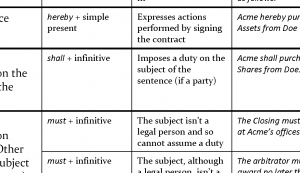 Readers with a long memory will remember this 2014 post about a “quick reference” analysis of the categories of contract language prepared by a seminar participant.
Readers with a long memory will remember this 2014 post about a “quick reference” analysis of the categories of contract language prepared by a seminar participant.
Well, after almost three years, I’ve come up with my own version, or at least a first draft of it. Go here for a PDF. (The “Reference” column is for citations to MSCD; I’ll do that later.)
I’d be pleased to receive comments.

Great cheat sheet! A few comments:
1. On conditions, when there are more than one, shouldn’t the “that” come before the colon and the conditions be enumerated? Saves repetition.
2. The example you have for “acknowledge” really should be a statement, since whether the investor has received something is within that investor’s knowledge, not the other party’s.
3. For intention, I always thought the idea was to state how the parties would handle something that is really outside their control, typically how a court should construe something. The parties can’t definitively establish (by saying so) that someone is an independent contractor, or that a copyrightable work is work made for hire, other than by complying with specific legal requirements. However, they can *intend* these results and by saying so hope to persuade a court to exercise discretion in the direction of those intentions in close cases.
4. Recommendation: I may be the last person on earth who still cringes at the pompous spelling of “adviser” with an “o,” but there it is. We’re against pomposity, no?
1. See MSCD 3.260: “To make it clear that one is dealing with conditions, express each closing condition as a tabulated enumerated that-clause.”
2. Oops, you’re right; will fix.
3. I use language of intention when the party in question does have control. Whether the consultant is an independent contract is a function of how the relationship is structured. That won’t happen until after the contract is signed, hence the language of intention.
4. OK, OK, “adviser” it is.
1/ I’m with Vance on getting rid of the *that* repetition. A better way to make it clear that one is dealing with conditions is for the introductory clause to say so: “Acme is not required to close unless Widgetco has met the following conditions.”
4/ Ngram shows ‘adviser’ in steady decline and ‘advisor’ steadily rising. The lines have nearly crossed: http://bit.ly/2kWf2sZ
Great stuff Ken. How would this look in landscape? Especially the “Context” column is hard to read because it is so narrow.
Yes, I should make that column wider. I kept things tight because it will appear in the next edition of MSCD, and there won’t be a lot of room.
I’ve now made that column a little wider.
OK. If you want to use it as a handout too, I think you should consider a landscape version perhaps with a notes column? By the way full stops appear to be missing in a number of the entries in the Context column.
Thanks—all periods now gone.
I expect I’ll get a designer involved at some point. And a handout version might make sense.
Ken, I don’t mean to sound “cute,” but do you have any third-party sources to support all – or part – of this nomenclature? Or are these classifications simply the result of your own research over the years? Thanks.
In the course of building this framework, I consulted The Cambridge Grammar of the English Language (and its authors) and many books on English usage generally. And a large part of it is of course my understanding of contract usages and the fights people get into over them. You’ll find nothing else like it out there.
I cobbled together the terminology. “Language of performance” is based on the linguistics term “performative.” “Language of policy” I invented. The other labels are straightforward.
Very useful. Thanks, Ken.
My drafting contracts students will be very pleased to have this resource!
I did notice one typo- in the “Context” column for language of intent, the words “what happens” should be “that happen.”
Thanks! I’ve posted a corrected version. I deleted “happen” entirely: circumstances don’t happen, they just are!
Gold. Thank you.